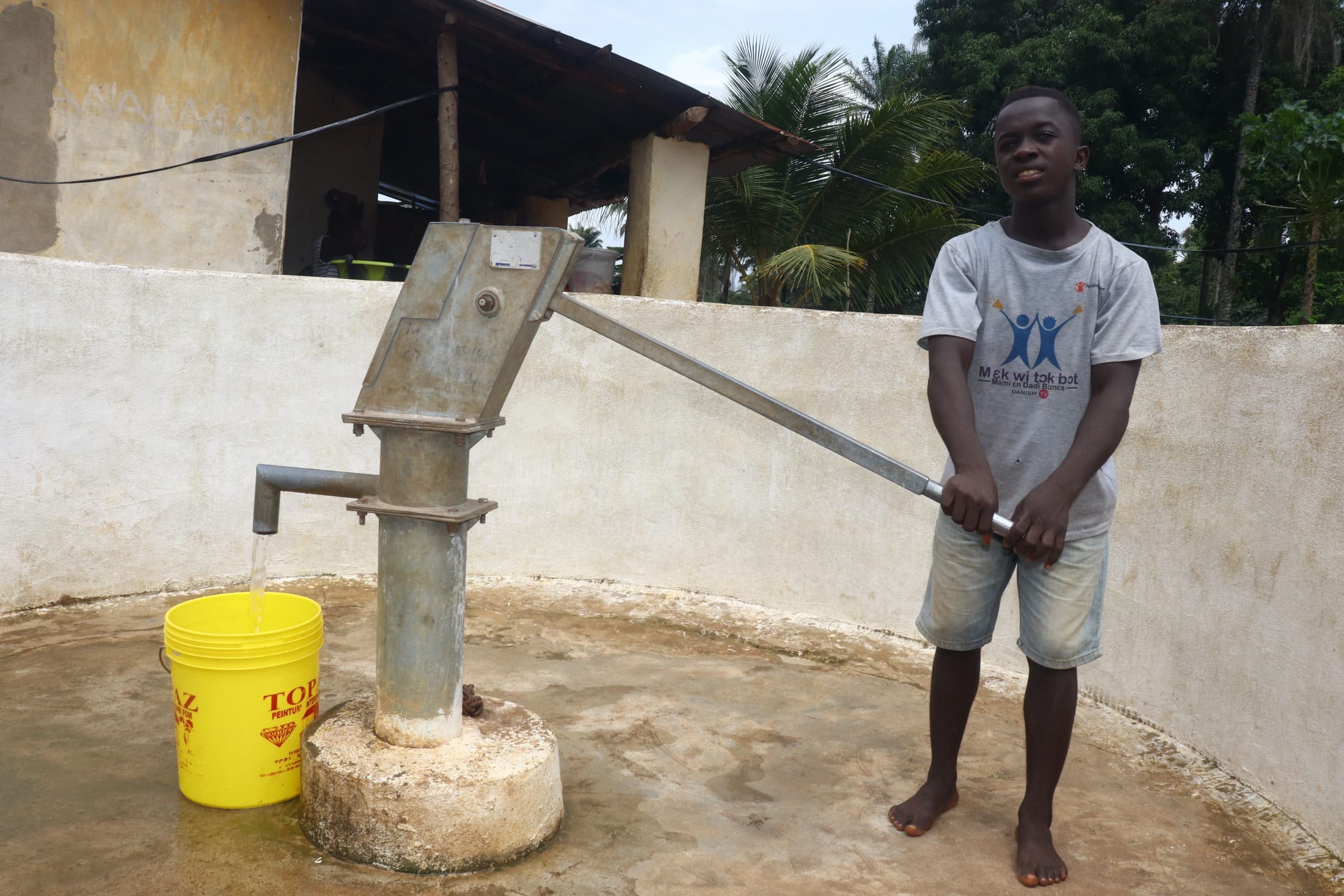In 2022, the well in Mathen failed to yield water from March through June. Each year, the well's dry period extends further as climate change lowers the region's water table. This leaves the water-fetchers of the community battling treacherous terrain multiple times a day in search of water at the local swamp.

Using water from the swamp is also detrimental to the community members' health. When they bathe with it, they develop skin rashes. They must also launder their clothes on the shores of the water source, which fills the pool with suds. The swamp is open to contamination from human, animal, and environmental factors. Drinking the water infects them with diarrheal diseases that they must spend precious money to treat.
For 33-year-old Hawa (pictured above on the path home from the swamp), this situation is devastating. As a mother and soap trader, the water crisis robs her of time, energy, and money every day.
"I produce local soap to sell for my living, and my husband is not staying with me," Hawa explained. "He only sends me an amount of money every month for my living with my four children. I must wake up early morning to get water from the swamp at [a] far distance, and I find it hard to make [multiple] trips a day, unless I must involve my children to assist me [to] collect water. I cannot produce enough soap at this time because of the water challenges in my village."

And even when Mathen's well (pictured above covered by logs) is working, it is only one water source serving a congested community. People must line up and wait for their turn to fetch water during peak collection times, which wreaks havoc on people's schedules and well-being.
"The only well in the community gets overcrowded in the morning hours and gets dry or provides [a] low quantity of water," Hawa said. "Most people need water and use it for domestic activities. I need enough water to prepare the soap. As a result, this affects me greatly. At times I must hire [a] motorbike to transport the water containers, which also affects my saving from the business that I should use for my welfare. I think if the water well in my village is rehabilitated, it will help me greatly."
"I must fetch water very early in the morning before going to school," said 14-year-old Aminata S, shown below concentrating on her journey home.

"I am the [eldest] child in my family, so I am responsible to fetch water at home," Aminata continued. "My mother is a trader. She walks in different communities to trade for our living and welfare and prepare food for the house. When my mother is not around, I have to fetch water for cooking, drinking, and laundering clothes. This causes delays for me to do [my] domestic activities on time. Because of the water problem in my community, I [do] not have enough time to rest and also to read my lesson notes because, most often, I [am] engaged in fetching water. I will be grateful if the water source gets rehabilitated."
Rehabilitating Mathen's well will hopefully improve people's health as well as their livelihoods. And with water close at hand, their schedules and tasks should be simpler to manage.
Note: Our proposed water point can only serve 300 people per day. We are working with the community to identify other water solutions that will ensure all 337 people in the community have access to safe and reliable drinking water.
Here’s what we’re going to do about it:
Well Rehabilitation
The well marked for this overhaul is dry for a few months every year and needs major work to supply adequate, clean water to the community year round. The pump will be removed, and a hand auger will be lowered inside and powered by a drill team. This hand auger will allow the team to drill several meters deeper to hit a sufficient water column that will ensure the well supplies water throughout all seasons.
As the team drills, casing will be installed, transforming the bottom of this hand-dug well into a borehole. PVC piping will connect this lower system directly to the pump, a construction that we know will also improve the quality of water.
Once this plan is implemented, everyone within the community will have access to safe drinking water in both quality and quantity, even through the dry months.
Hygiene and Sanitation Training
There will be hygiene and sanitation training sessions offered for three days in a row.
After our visit, the hygiene and sanitation trainer decided it would be best to teach community members how to build a tippy tap (a hand-washing station built with a jerrycan, string, and sticks). They will use these tippy taps for handwashing demonstrations, and will also teach about other tools like dish racks and the importance of properly penning in animals.
These trainings will also strengthen the water user committee that manages and maintains this well. They enforce proper behavior and report to us whenever they need our help solving a serious problem, like a pump breakdown.





 Borehole Well and Hand Pump
Borehole Well and Hand Pump


























